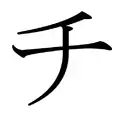チ
 | ||||||||
| ||||||||
| ||||||||
| ||||||||
Japanese
| Stroke order | |||
|---|---|---|---|
Etymology
Simplified in the Heian period from the man'yōgana kanji 千.
Syllable
チ (romaji chi)
Usage notes
Unlike the hiragana system, used for Japanese language words that kanji does not cover, the katakana syllabary is used primarily for transcription of foreign language words into Japanese and the writing of loan words (collectively gairaigo), as well as to represent onomatopoeias, technical and scientific terms, and the names of plants, animals, and minerals. Names of Japanese companies, as well as certain Japanese language words, are also sometimes written in katakana rather than the other systems. Formerly, female given names were written in katakana. [edit]
This article is issued from Wiktionary. The text is licensed under Creative Commons - Attribution - Sharealike. Additional terms may apply for the media files.